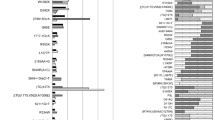Abstract
Cystic fibrosis (CF) patients show a high degree of linkage disequilibrium between the CF transmembrane conductance regulator (CFTR) gene and polymorphisms 5′ of that gene. To determine whether the region 5′ of CFTR contains biologically important sequences, the allele frequencies of six CFTR-linked polymorphisms (metH/MspI, XV-2c/TaqI, CS.7/HhaI, KM19/PstI, MP6-d9/MspI, J44/XbaI) were determined in 417 randomly selected elderly individuals (over 75 years of age) from the Czech population. The elderly individuals were considered “escapees” of strong selective pressures that had operated during their lifetime, prior to the introduction of modern health care since 1950. The pooled allele frequencies of the analyzed marker polymorphisms in the elderly did not significantly differ from published data. However, when analyzed by sex, the allele frequencies of markers CS.7/HhaI and KM19/PstI differed significantly (P < 0.05) between elderly females and males. The allele frequencies of the six polymorphisms were then determined in 646 newborns and 345 young adults of reproductive age; these individuals were selected in a similar manner and drawn from the same population. In these control groups, the studied marker polymorphisms exhibited no statistically significant differences between sexes and/or between individuals of the same sex, only between different age groups. A gradual relative increase in the frequency of allele “2” of marker CS.7/HhaI was observed from newborn females to elderly women, the overall difference in allele frequencies of this marker polymorphism between newborn females and elderly women reaching statistical significance (P < 0.05). Interestingly, allele “2” is the major constituent of the extended “B-haplotype”, which is in strong linkage disequilibrium with common CF alleles. Taken together, our data suggest that the region spanning markers CS.7 and KM19 is associated with a genetic factor that influences postnatal female survival, providing a possible mechanism for increasing the frequency of particular mutations in the adjacent CFTR gene.
Similar content being viewed by others
Author information
Authors and Affiliations
Consortia
Additional information
Received: 30 January 1996 / Revised: 16 December 1996
Rights and permissions
About this article
Cite this article
Macek Jr., M., Macek Sr., M., Krebsová, A. et al. Possible association of the allele status of the CS.7/HhaI polymorphism 5′ of the CFTR gene with postnatal female survival. Hum Genet 99, 565–572 (1997). https://doi.org/10.1007/s004390050407
Issue Date:
DOI: https://doi.org/10.1007/s004390050407




